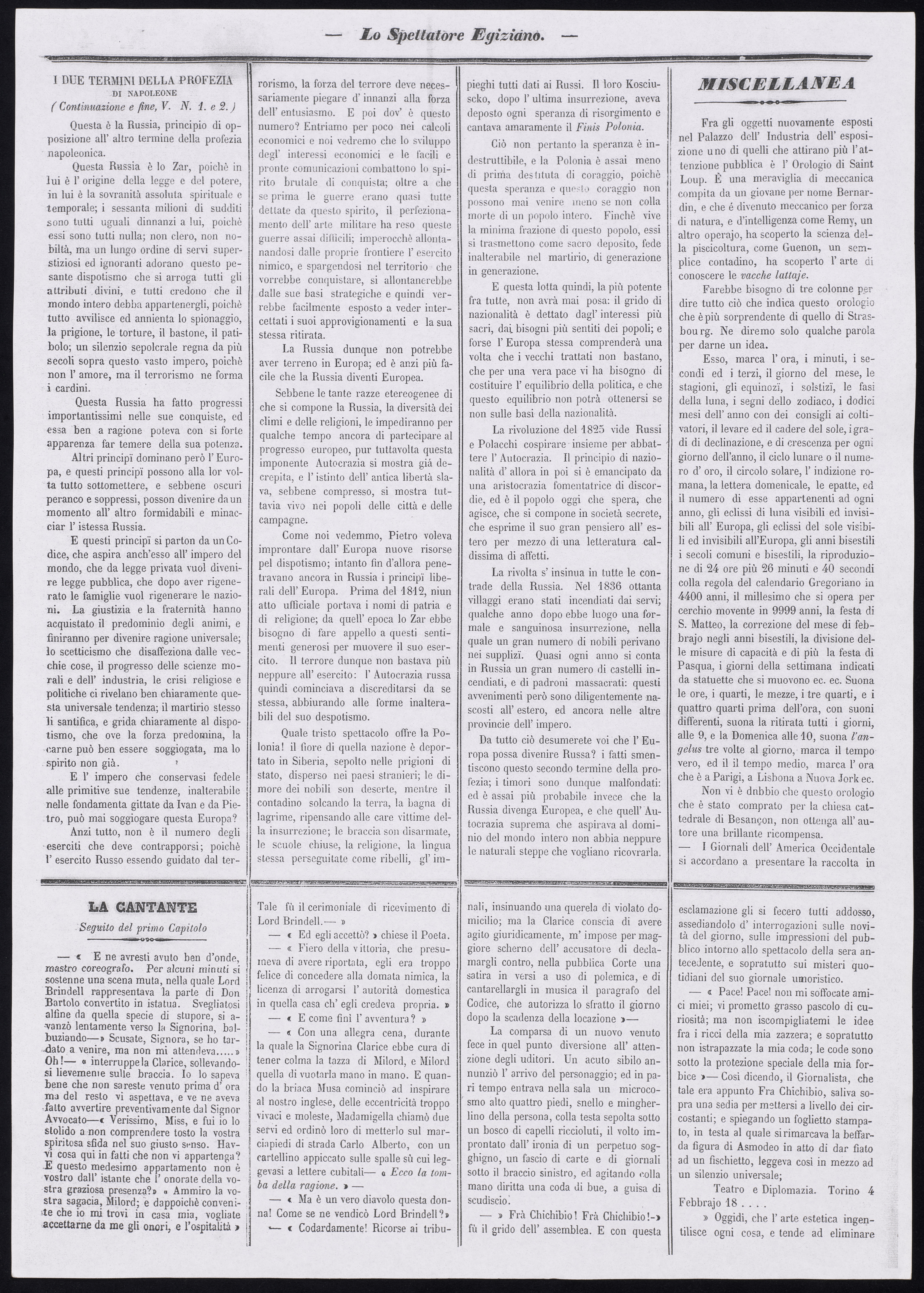20 October 1855: Sheet #2
Original title: spettatore-egiziano_0014.jpg

Transcription
The Singer
'Continuation of the first Chapter' –And you would have had good WAVES, master choreographer. For a few minutes the scene remained silent, in which Lord Brindell played the part of Don Bartolo converted to ISTATUA. Finally awoken from a kind of stupor, he slowly advanced towards the young lady, stuttering – Excuse me, miss, if I was late, but I wasn't expecting...–Oh!–Clarice interrupted, lifting herself up lightly onto her arms.–I knew that you wouldn't come before now, but the rest are waiting for you, and they had made you warn ahead of time from Mr. Lawyer – Very true, Miss, and I was the fool for not promptly understanding your witty game in your right sense. In fact, is there something here that does not belong to you? And is this same apartment not yours from the moment that you grace it with your presence? – –I admire your astuteness, Milord, and since/after I find myself well in my house, you want accept my reputation and hospitality.– This was Lord Brindell's welcome reception.– –And he accepted?–asked the Poet. –Proud of the victory, which he assumed to have reported, he was too happy to concede to the tamed enemy, the license to claim domestic authority in that home that he believes is his own– –And how did the adventure end?– –With a pleasant dinner, during which Miss Clarice took care to keep Milord's glass full, and Milord to empty it hand by hand. And when the drunk Muse start to inspire our Englishman, with overly lively and incessant eccentricities, mademoiselle called two servants and ordered them to put Carlo Alberto on the sidewalk with a card stuck to his shoulders that said in block letters – Here is the tomb of reason.– –This woman is a real devil! How did Lord Brindell avenge himself? –Like a coward! He turned to the courts, filing a complaint of domestic violence. But Clarice, aware of having acted judiciously, imposed me out of great scorn to declaim against the accuser in public court through a satire in verse for use of debate, and to hum the paragraph of the Code, which authorizes the eviction the day after the rent is due.– The appearance of a newcomer at that moment diverted the listeners' attentions. A piercing whistle announced the arrival of the character, and at the same time a microcosm entered into the room. Slender and skinny, with his head buried under a forest of curly hair, his face marked by the irony of a perpetual sneer, a bundle of papers and newspapers under his left arm, and waving an oxtail with his hand outstretched like a whip. –Brother Chichibio! Brother Chichibio! –the assembly shouted. And with this exclamation they all charged at him, inundating him with questions about the news of the day, about the public's impression of the previous day's performance, and most of all, about the daily mysteries of his comedic newspaper. –Peace! Peace! don't suffocate me, my friends; I'll grant you abundant food for your curiosity. But don't make a mess of my ideas among the curls of my mop of hair. And above all don't mistreat my tail; tails are under the special protection of my scissors–Saying this, the Journalist, who was precisely Brother Chichibio, climbed up onto a chair to put himself at the same level as those surrounding him. And unfolding a piece of printed paper, on the front of which there was a picture mocking Asmodeo of him taking a breath to whistle, he read aloud among a universal silence: Theater and Diplomacy. Turin February 4, 18... –Nowadays, since aesthetic art refines everything, and tends to eliminate